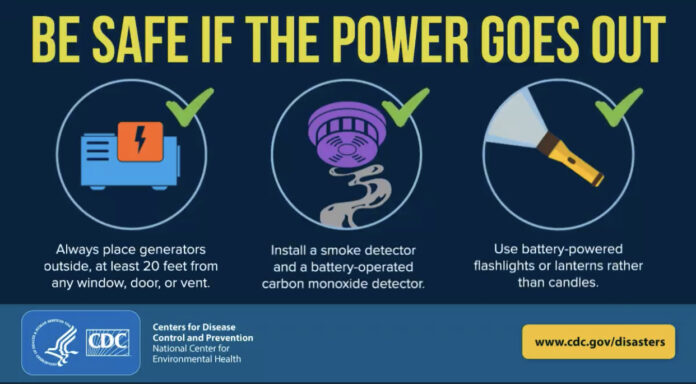WASHINGTON, D.C. – CDC offers these tips to help you prepare for and cope with sudden loss of power.
Take Action
- To prevent carbon monoxide poisoning, use generators, pressure washers, grills and similar items outdoors only. Generators should be used at least 20 feet away from your home.
- Identify and throw away food that may not be safe to eat.
- Check with local authorities to be sure your water is safe.
- In hot weather, stay cool and drink plenty of fluids to prevent heat-related illness.
- In cold weather, wear layers of clothing, which help to keep in body heat.
- Avoid downed power lines, if a power line falls on a car, you should stay inside the vehicle.
Food Safety
If the power is out for less than 4 hours, then the food in your refrigerator and freezer will be safe to consume. While the power is out, keep the refrigerator and freezer doors closed as much as possible to keep food cold for longer.
Refrigerated or frozen foods may not be safe to eat after the loss of power. Find out what you can do to keep food safe during a power outage, and when you need to throw away food that could make you sick.
BEFORE:
- Keep appliance thermometers in your refrigerator and freezer. The refrigerator should be at 40°F or below. The freezer should be at 0°F or below.
Prepare for emergencies or natural disasters:
- Freeze containers of water and gel packs to help keep your food at 40°F or below.
- Have a cooler and frozen gel packs handy in case you have to remove your food from the refrigerator to keep it cold.
- Buy dry ice or block ice to keep your food cold in the refrigerator if you think the power will be out for a long time.
DURING:
- Keep refrigerator and freezer doors closed.
- If the doors stay closed, food will stay safe for up to:
- Four hours in a refrigerator
- 48 hours in a full freezer; 24 hours in a half-full freezer
- If the power has been out for four hours, and a cooler and ice are available, put refrigerated perishable foods in the cooler. To keep them at 40°F or below, add ice or a cold source like frozen gel packs.
AFTER:
- Never taste food to determine if it is safe to eat. When in doubt, throw it out.
- Throw out perishable food in your refrigerator (meat, fish, cut fruits and vegetables, eggs, milk and leftovers) after four hours without power or a cold source like dry ice. Throw out any food with an unusual odor, color or texture.
- Check temperatures of food kept in coolers or your refrigerator with an added cold source. Throw out food above 40°
- If you have an appliance thermometer in your freezer, check to see if it is still at 40 °F or below.
- You can safely refreeze or cook thawed frozen food that still contains ice crystals or is at 40 °F or below.
Safe Drinking Water
When power goes out, water purification systems may not be functioning fully. Safe water for drinking, cooking and personal hygiene includes bottled, boiled or treated water. Your state, local or tribal health department can make specific recommendations for boiling or treating water in your area.
Medications
Some drugs require refrigeration to keep their strength, including many liquid drugs.
- When the power is out for a day or more, throw away any medication that should be refrigerated, unless the drug’s label says otherwise.
- If a life depends on the refrigerated drug, but the medications have been at room temperature, use them only until a new supply is available.
- Replace all refrigerated drugs as soon as possible.
Extreme Heat
Be aware of yours and others’ risk for heat stroke, heat exhaustion, heat cramps and fainting.
Heat stroke is the most serious heat illness. It happens when the body can’t control its own temperature and its temperature rises rapidly. Sweating fails and the body cannot cool down. Body temperature may rise to 106°F or higher within 10 – 15 minutes. Heat stroke can cause death or permanent disability if emergency care is not given.
If air conditioning is not available in your home:
- Contact your local health department or locate an air-conditioned shelter in your area.
- Spend some time at a shopping mall or public library–even a few hours spent in air conditioning can help.
- Take cool showers or baths.
- Don’t rely solely on fans to keep you cool. While electric fans might provide some comfort, when temperatures are exceedingly hot, they won’t prevent heat-related illness.




















